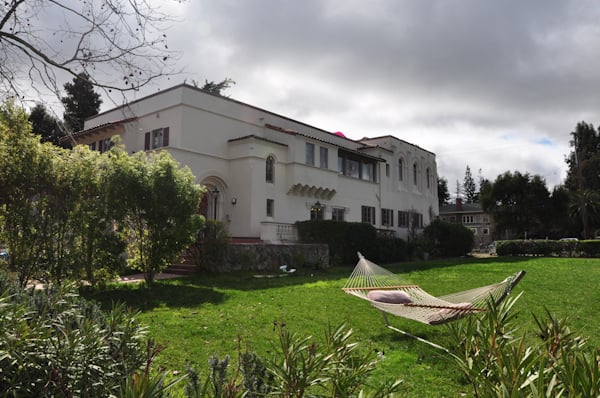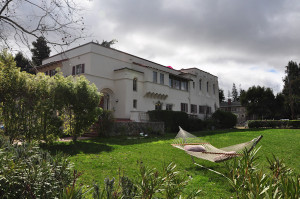Stanford’s recent decision to revoke Chi Theta Chi’s (XOX) lease has provoked a firestorm of criticism from XOX alumni and members of the Stanford community. The University, meanwhile, maintains that it holds student interest paramount and that student life at Chi Theta Chi need not change along with a shift in house oversight.
XOX community members allege that many of the University’s reasons for termination of the lease are false and that University officials “ambushed” XOX alumni members with the decision at a Feb. 8 meeting, according to an email from XOX Alumni Board members. University officials did not address this claim in a statement released in response to questions from The Daily, including a request to evaluate XOX’s claim that University officials gave them no forewarning about the decision.
Chi Theta Chi is one of two on-campus houses — the other being the fraternity Sigma Chi — not operated directly by the University, which instead owns the land on which the houses sit. The house lease is automatically renewed annually unless either XOX or Stanford exercises the option of unilaterally terminating the relationship prior to March 1.
Stanford is currently set to take control of the house on the first day of spring quarter, at which point residents will start paying rent directly to the University.
A joint statement, representing Residential Education, Student Affairs, Student Housing, Residential Dining & Enterprises and other University administrative bodies, cited “legal, facility stewardship and fiscal/operational issues” as the basis of the University’s decision to terminate the lease. The statement declined to go into detail about these issues, “out of respect for the alumni board and the past and current residents of the house.”
“Some of these issues have been ongoing for some time, but some new issues have arisen recently and the severity of others has escalated,” the University statement said. “The decision not to renew this lease should not reflect on the actions of the current or prior Chi Theta Chi student community.”
Abel Allison ‘08, president of the XOX Alumni Board, acknowledged that some of the reasons for the lease termination as provided by the University to XOX — such as failing multiple fire inspections of the house — are true. However, Allison said that XOX residents and managers have consistently and promptly enacted recommendations and guidance put forward by University officials.
Allison also disputed the administrators’ allegation that XOX has been employing the tax identification number of Theta Chi Fraternity — from which XOX formally split in the late 1980s — even after the receipt of a cease-and-desist letter from that organization, which Allison further denied ever receiving.
“We believe that we have been filing our taxes correctly for as long as we’ve been an organization,” Allison said. “We’re working to document that and have been communicating with Theta Chi.”
The Theta Chi fraternity had not returned a call from The Daily at the time of publication.
Allison also denied that XOX was at risk of default, as charged by University administrators.
“We are happy to show documentation of our financial solvency,” Allison said, “And [of] the availability of funds to continue to take care of the house.”
In a Feb. 8 letter to XOX, the University additionally cited the house’s failure to maintain corporate status in California as grounds for terminating the house’s lease. Former XOX Resident Assistant (RA) Bear Douglas ’09 M.A. ’10 told The Daily Wednesday that — having filed and processed all relevant documentation — the suspension imposed on XOX’s status has been lifted.
Keith Nelson ‘76 Ph.D. ‘81, a XOX alumnus and current professor at MIT, said that XOX’s traditional independence enables residents to gain practical experience running a functioning household with a great degree of control and responsibility, as well as the ability to materially improve the house through their own initiative and resources.
“That independence won’t exist anymore,” under direct University supervision, Nelson said. “Other types of housing have a certain uniformity or institutional feel … The house was able to maintain a pretty distinctive feel that gained substantially from the incentives that we [students] had in running it.”
The University responded to similar concerns in its statement, saying, “It is our hope that the essence of the Chi Theta Chi student experience will not change; it is the oversight and management of the facility that is changing, not the program.”
Allison described the University as “extremely aggressive” in its efforts to begin the transition process, but said that the XOX community is “working as hard as we can to turn this into a discussion [with the University].”
Allison said that there had been no attempt by the University to make XOX aware of the possibility of losing the lease, nor had there been any effort to mediate or negotiate a solution to the problems the University cited beyond routine communication with administrators.
“Communication with the University has been limited over the past number of months,” Allison said. “We have worked with University officials regarding small issues, but no prior notice regarding the lease had been given.”
Mike Harville ‘92, a member of XOX’s Alumni Board, noted that XOX’s lease had been threatened by the University in previous years and dismissed the idea that any radical changes in XOX’s operation this year prompted the University’s intervention. He expressed cautious optimism, however, about the prospects of XOX’s chances for survival given the reaction of XOX students and alumni, a sentiment echoed by Allison.
“We don’t know if the University will let this become a discussion,” Allison said. “If it does, we want to have the most positive and constructive discussion we can, including how we need to change moving forward to ensure this doesn’t happen again while still preserving the culture of the house.”
The University’s statement expressed the possibility of dialogue concerning how best to move forward, though it gave no indication that renewal of the lease might be a topic of discussion.
“These specific issues going forward will be discussed in the transition meetings planned between the alumni group and Student Housing and Residential Education officials over the next few weeks,” the statement said, referring to concerns of Chi Theta Chi losing its unique culture.
A petition supporting Chi Theta Chi’s independence circulated through email chains and Facebook on Tuesday and Wednesday, gaining over 1,400 signatures by the time of publication.
“We’ve had so many people express their support for this defining aspect of the house,” Allison concluded. “We believe that we’re doing everything we can. … We’re committed to doing whatever it takes to preserve this house.”

